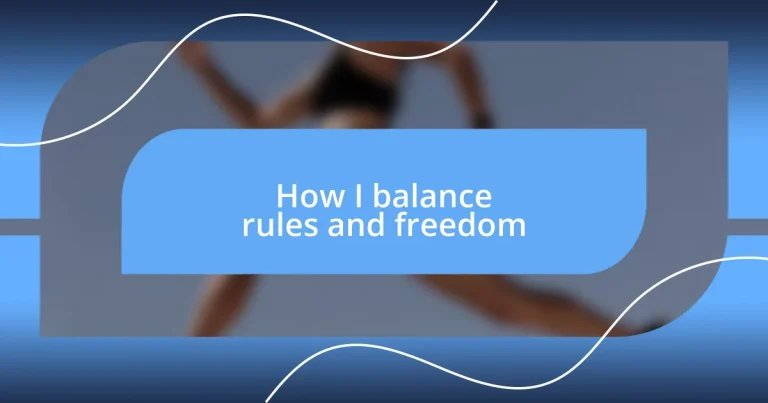Key takeaways:
- Balancing rules and freedom requires self-reflection and adaptability, allowing for personal growth and creativity.
- Establishing personal boundaries enhances relationships and overall well-being, promoting a healthier life balance.
- Regularly reassessing and adapting rules to fit changing circumstances fosters a collaborative environment and greater satisfaction.
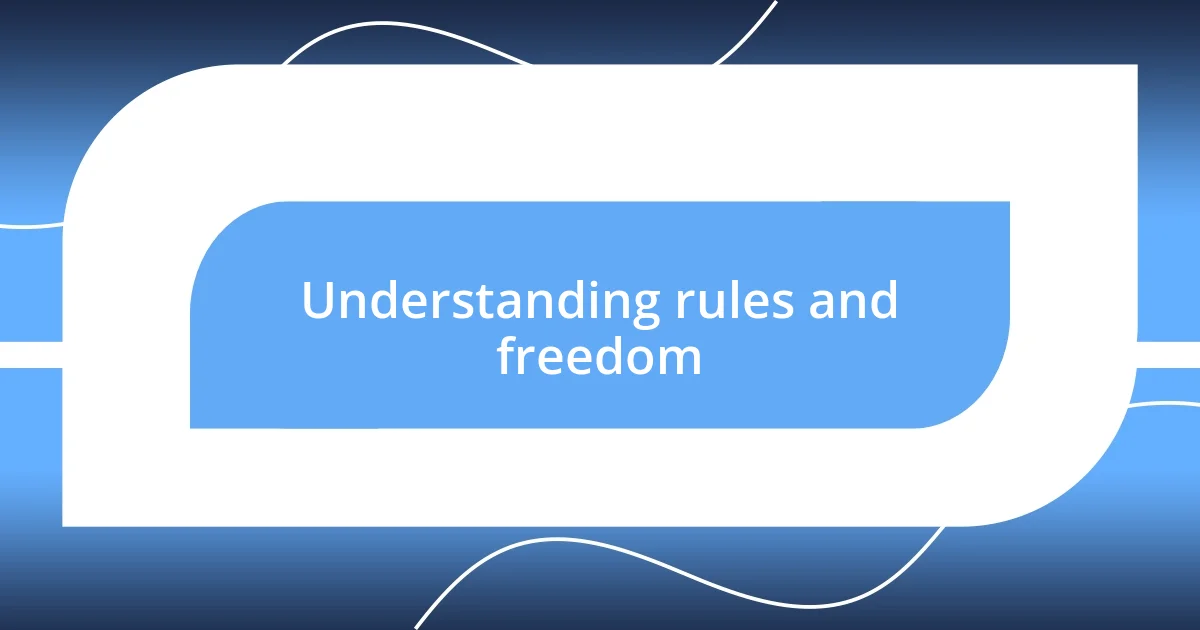
Understanding rules and freedom
Rules and freedom often seem at odds with one another. I remember a time in my life when I was navigating my first job. Rigid rules felt suffocating at first, making me yearn for the freedom to express myself creatively. But then I realized that those rules provided a structure that actually allowed me to thrive. Isn’t it interesting how the very boundaries that feel restrictive can also serve as a foundation for growth?
On the flip side, I have encountered moments where too much freedom led to chaos. I once joined a group project with barely any guidelines, and it quickly spiraled into confusion. Everyone had different ideas but no clear direction. That experience taught me that while freedom is essential for creativity, without some level of structure, it can feel overwhelming. Have you ever been in a situation where you craved freedom but found yourself lost without any rules?
Understanding the balance between rules and freedom is like walking a tightrope. It requires constant adjustments and honest self-reflection. I’ve found that setting personal guidelines within my freedom helps me stay focused while still allowing space for creativity and exploration. How do you find that balance in your life?
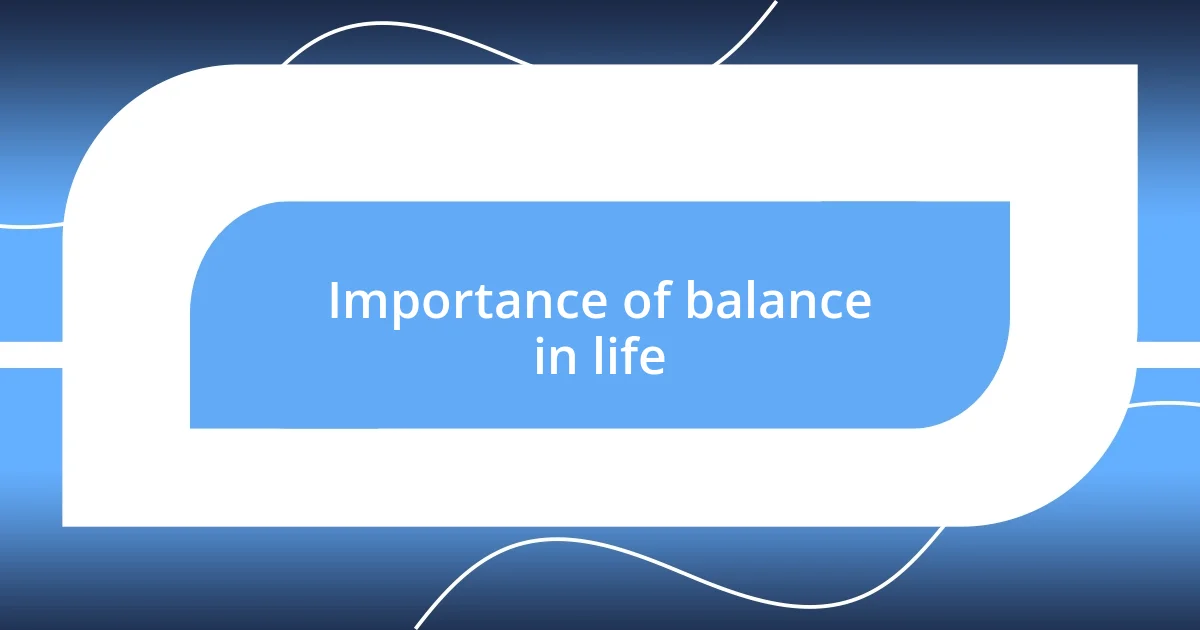
Importance of balance in life
Finding balance in life is crucial. I’ve often experienced that too much focus on either rules or freedom can lead to stress or stagnation. For example, during my college years, I dove headfirst into an unstructured lifestyle, thinking it would be liberating. While I enjoyed the freedom, my academics suffered. It was a wake-up call that taught me the value of incorporating some structure into that freedom.
- Balance allows us to manage stress effectively.
- It fosters personal growth and self-discipline.
- Creating boundaries can enhance our creativity.
- It leads to a more fulfilling and meaningful life.
- A balanced life promotes healthier relationships with ourselves and others.
Achieving this harmony isn’t a one-time thing; it’s an ongoing process of adjusting to life’s demands. I continually evaluate what I need to feel grounded and how much freedom I can handle without feeling lost. It’s enlightening to realize that neither extreme holds all the answers, but a thoughtful blend does.
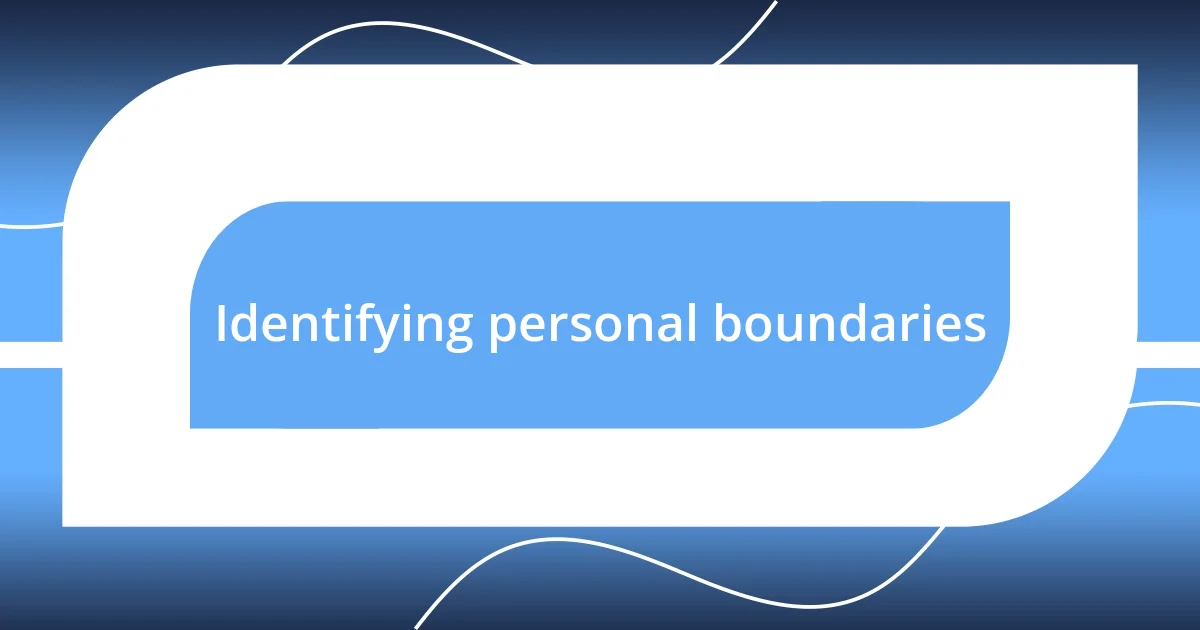
Identifying personal boundaries
Understanding personal boundaries is vital in navigating the delicate balance between rules and freedom. I remember when I first started exploring my independence during my teenage years. It was liberating to make choices about my time and activities, yet sometimes I found myself overwhelmed by the decisions I had to make. Establishing boundaries helped me navigate through this chaotic phase. I discovered that knowing when to say ‘no’ was just as important as seizing opportunities.
Creating personal boundaries can initially feel uncomfortable. I can relate to moments when I worried about disappointing others if I set limits on my availability. However, I learned that honoring my time not only benefited me but also improved my relationships. Giving myself the space to breathe and reflect allowed me to show up for friends and family more authentically. Have you felt hesitant to draw the line, only to realize it strengthens your connections in the long run?
One of the most enlightening experiences for me was during a particularly demanding job. I was committed to meeting my responsibilities, yet I ended up working late nights and weekends. When I finally took a step back, I recognized my boundaries were blurred. After implementing clear limits on my work hours, not only did my productivity improve, but my overall happiness did too. Finding that sweet spot between commitment and self-care is truly a game changer.
| Boundary Type | Example |
|---|---|
| Emotional Boundaries | Limiting the extent to which others impact your mood or feelings. |
| Time Boundaries | Allocating a specific amount of time to work, leisure, or self-care. |
| Physical Boundaries | Determining your personal space and comfort level with physical touch. |
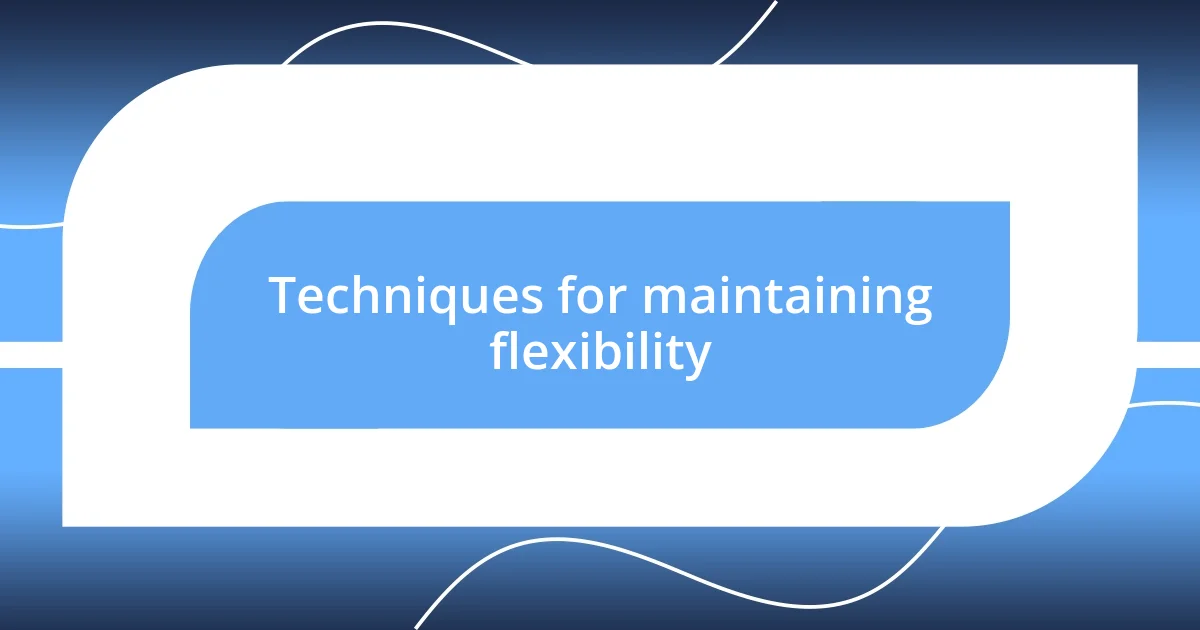
Techniques for maintaining flexibility
Maintaining flexibility often requires techniques that allow us to adapt without feeling overwhelmed. One approach I find particularly effective is incorporating regular check-ins with myself. Every Sunday evening, I take a moment to reflect on my week—what went well, what felt restrictive, and where I could use a bit more freedom. These moments of introspection help me recalibrate and ensure I’m weaving both rules and freedom into my life effectively. Have you ever thought about doing a weekly review?
Another technique I’ve adopted is creating “freedom blocks” in my schedule. These are designated periods where I allow myself to explore activities that pique my interest, free of any obligations. I remember one time when I set aside a Saturday afternoon just to experiment with painting, an activity I hadn’t done in years. That unstructured time reignited my creativity and reminded me of the joy that comes from spontaneity. When was the last time you indulged in a passion without constraints?
Lastly, I practice mindfulness to maintain that flexibility. It helps me stay present and aware of my feelings, which is crucial when juggling both rules and freedom. For instance, during a particularly busy week at work, I noticed my stress rising. Instead of pushing through mindlessly, I took a few minutes to breathe and ground myself. That simple act helped me find clarity, allowing me to finish my tasks with renewed energy and focus. Have you considered how mindfulness could play a role in your life balance?
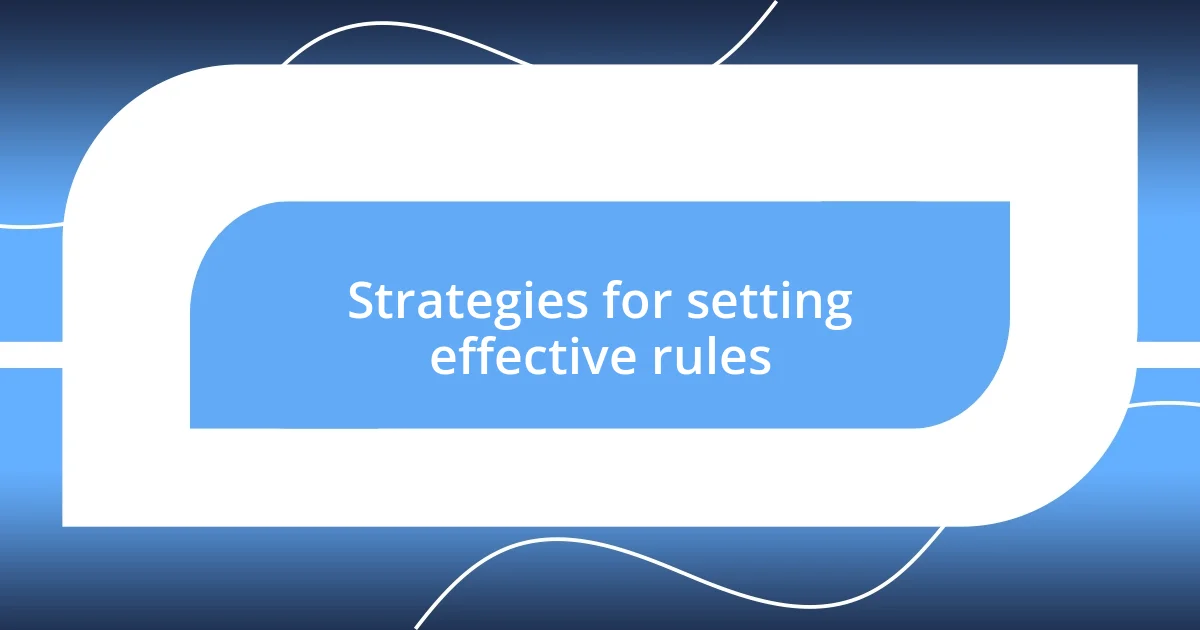
Strategies for setting effective rules
Setting effective rules often starts with clear communication. I remember attending a workshop on team dynamics where the facilitator emphasized that rules should be explained, not just imposed. When I took this to heart, I found that sharing the reasoning behind specific guidelines not only fostered understanding but also made everyone more likely to respect them. Have you ever noticed how a simple conversation can shift perspectives?
I’ve also learned the importance of being flexible with rules. For instance, during a family game night, we had a strict no-phone policy to encourage engagement. However, when my teenage niece expressed her discomfort, I decided to allow phones for music. This small adjustment made the evening enjoyable for everyone while still maintaining the spirit of our original rule. Have you tried finding that balance with your own set of rules?
Lastly, it’s crucial to regularly reassess your rules. I find that life evolves, and so should our guidelines. In my own experience, I used to hold onto certain rules out of habit, only to realize they no longer served me. One memorable evaluation led me to drop a long-standing ‘no working on weekends’ rule, allowing me to catch up when life got hectic. That decision eased my stress and provided a newfound freedom. How often do you take time to reflect on the rules guiding your life?
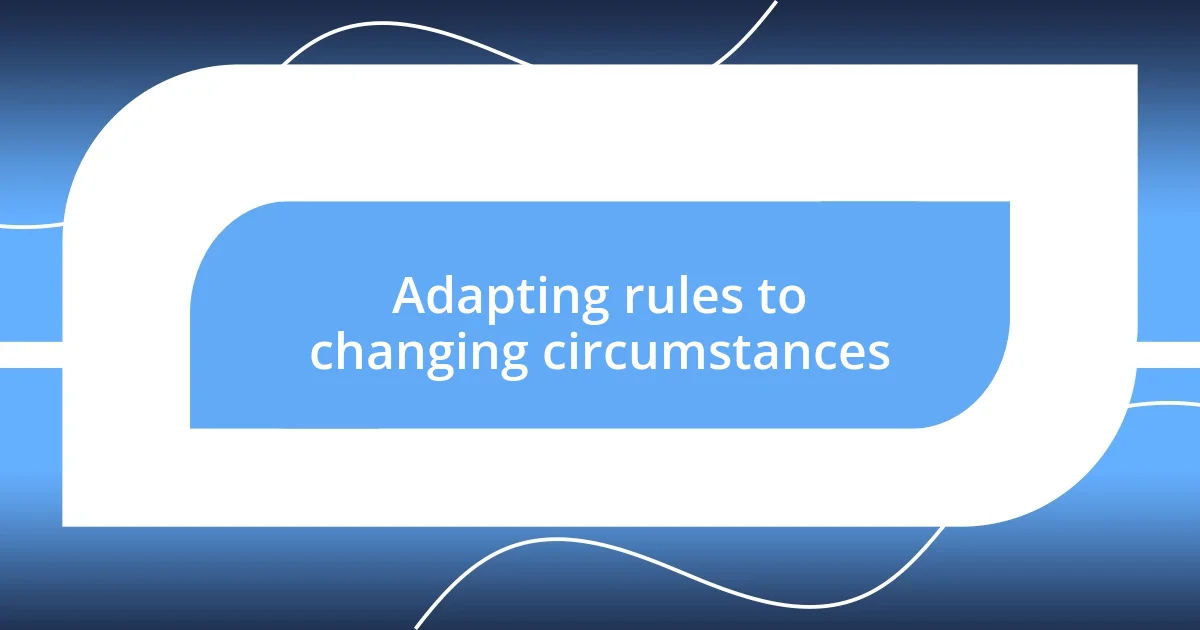
Adapting rules to changing circumstances
Adapting rules to changing circumstances is an essential skill I’ve honed over time. For instance, during the pandemic, I noticed that my old routine felt suffocating. So, I started adjusting rules in my work-from-home setup—such as shifting my work hours to late mornings. This simple change helped me maintain productivity while aligning better with my energy levels. Have you ever reconsidered your own patterns when faced with new challenges?
I also believe it’s vital to remain open to feedback when adapting rules. Last summer, I organized a neighborhood book club, and our initial schedule didn’t suit everyone. When some members expressed their struggles, I quickly shifted our meetings from weekly to bi-weekly. This minor adjustment not only increased attendance but also created a more relaxed atmosphere. Sometimes, a little flexibility goes a long way. How do you handle feedback when rules don’t quite fit?
Reflecting on my experiences, I find that the art of adaptation often requires a dash of creativity. A couple of months back, I came across a cooking class that was originally super strict about dietary rules. However, I proposed a themed night where everyone could bring their own preferred ingredients. This twist not only honored everyone’s tastes but also created a lively, collaborative spirit. Have you thought about how a small creative change could transform your own set of guidelines?
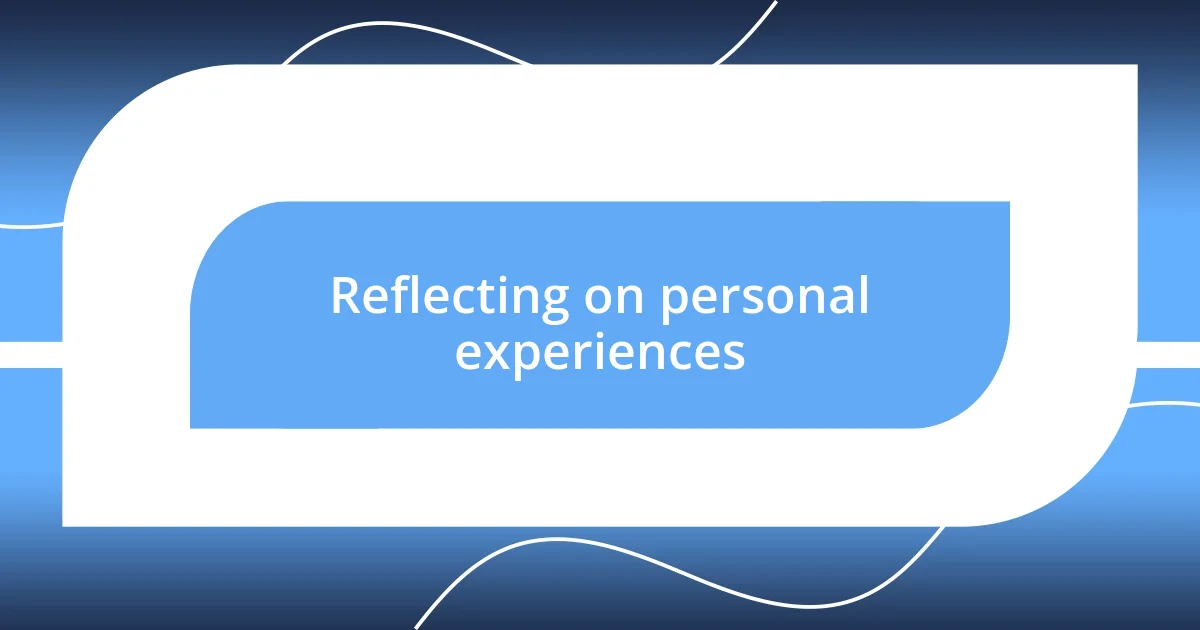
Reflecting on personal experiences
Reflecting on personal experiences reveals so much about how I balance rules and freedom. I remember a time when I enforced a strict bedtime for my children. As they grew older, I realized this rigid rule stifled their independence. One night, I decided to let them stay up a bit later, noticing their eyes light up with excitement. That small change opened communication about responsibility and trust, reshaping our nightly routine into a more enriching experience. Have you reflected on how your rules impact those around you?
Another experience that stands out is my role as a mentor at work, where I initially established strict deadlines for project submissions. However, as I got to know my team better, I began to understand their unique challenges and the stress those deadlines caused. One open conversation revealed that some preferred a flexible timeline. By allowing my team to suggest deadlines, I fostered a collaborative environment, which also boosted creativity and morale. How often do you check in with others to see how rules affect them?
I’ve noticed that reflection isn’t just about rules; it’s also about understanding my values. I once realized I was holding onto an old rule about always tracking every expense meticulously. This habit made budgeting feel like a chore and drained my enthusiasm. So, I shifted my approach to focus on budgeting only for what truly mattered to me. Surprisingly, I found more joy and spontaneity in how I spent my money. What rules have you found that no longer resonate with your values?












